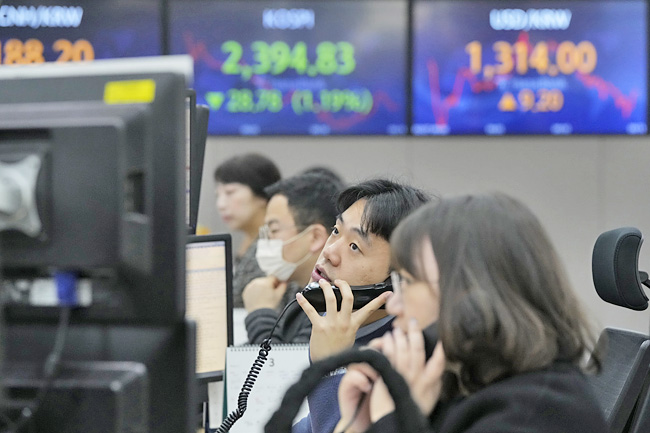AP – Wall Street pointed toward gains before the opening bell yesterday after last week’s rout and ahead of another full slate of corporate earnings this week.
Futures for the benchmark S&P 500 rose 0.5 per cent and futures for the Dow Jones industrials moved 0.4 per cent higher.
Last week, United States (US)shares suffered their worst setback since early December. Reports on inflation, the jobs market and retail spending have come in hotter than expected, raising expectations that the Federal Reserve will have to maintain an aggressive fiscal policy stance in a lengthening battle against inflation, meaning an elevated benchmark interest rate.
Higher rates pressure business activity and investment, and a string of rate hikes has not led to a consistent slowing of growth as hoped.
“It is becoming increasingly apparent that inflation, and associated inflation expectations and wage pressures, will not decline in a predictable linear manner,” Mizuho Bank said in a commentary.
Fed Chair Jerome Powell has warned that any decline in prices would not be a straight line.
In premarket equities trading, Union Pacific jumped nearly 10 per cent after the railroad announced plans on Sunday to replace its CEO later this year.

The company has been pressured by a hedge fund that holds a USD1.6 billion stake in the railroad went public with its concerns about Lance Fritz’ leadership during the past eight years.
Seagen shares jumped more than 14 per cent early yesterday on a Wall Street Journal report that the drug giant Pfizer was in talks to acquire the company, adding to its stable of cancer treatments. Seagen was targetted last year by Merck.
The online video conferencing company Zoom reported quarterly earnings after the bell yesterday. It’s another heavy week for corporate financial results, particularly in the retail sector, with Target, Kohl’s, Costco and Best Buy all reporting in the coming days.
At midday in Europe yesterday, Germany’s DAX rose 1.6 per cent, while the CAC 40 in Paris added 1.7 per cent. Britain’s FTSE 100 gained 0.8 per cent.
In Asia, Tokyo’s Nikkei 225 index edged 0.1 per cent lower to 27,423.96 and the Kospi in Seoul gave up 0.9 per cent to 2,402.64.
In Hong Kong, the Hang Seng lost 0.3 per cent to 19,943.51 while the Shanghai Composite index was down 0.3 per cent at 3,258.03. Australia’s S&P/ASX 200 shed 1.1 per cent to 7,224.80.
Bangkok was 0.2 per cent lower while the Sensex in Mumbai dropped 0.6 per cent.
The measure of inflation preferred by the Fed, reported on Friday, said prices were 4.7 per cent higher in January than a year earlier, after ignoring costs for food and energy because they can swing more quickly than others. That was an acceleration from December’s inflation rate and was higher than economists’ expectations for 4.3 per cent.
It echoed other reports earlier in the month that showed inflation at both the consumer and wholesale levels was higher than expected in January.
Other data on Friday showed that consumer spending, the biggest piece of the economy, returned to growth in January, rising 1.8 per cent from December.
A separate reading on sentiment among consumers came in slightly stronger than earlier thought, while sales of new homes improved more than expected.
Such strength paired with the remarkably resilient job market raises the likelihood the economy might avoid a recession in the near term. But they also make it more likely that the Fed will keep interest rates higher for longer.
The anticipation is growing that the Fed will be forced to raise its benchmark rate to at least 5.25 per cent and keep it that high through the end of the year. It’s currently in a range of 4.50 per cent to 4.75 per cent, and it was at virtually zero a year ago. Expectations for a firmer Fed have caused yields in the Treasury market to shoot higher this month, and they were climbing again early yesterday.
The yield on the 10-year Treasury, which helps set rates for mortgages and other important loans, inched up to 3.96 per cent from 3.95 per cent late on Friday.
The two-year yield, which moves more on expectations for the Fed, rose to 4.84 per cent from 4.81 per cent and is near its highest level since 2007.
In other trading yesterday, US benchmark crude oil rose 26 cents to USD76.06 per barrel in electronic trading on the New York Mercantile Exchange.
It gained 93 cents to USD76.32 per barrel on Friday. Brent crude oil, the pricing basis for international trading, gained 28 cents to USD82.54 per barrel.
The dollar fell to JPY136.24 from JPY136.45. The euro rose to USD1.0562 from USD1.0549.
The S&P 500 fell 1.1 per cent on Friday to cap its third straight loss. The Dow Jones Industrial Average dropped one per cent and the Nasdaq composite lost 1.7 per cent.







